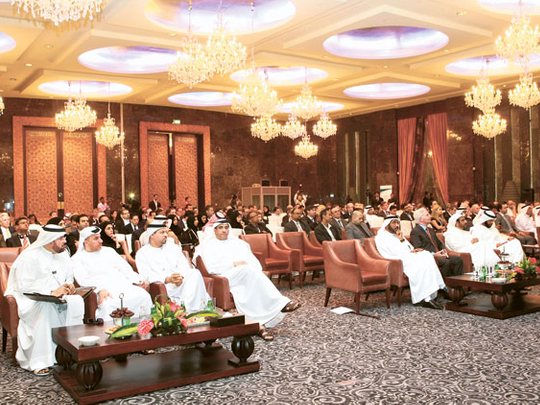
Dubai: The next phase of Dubai's economic growth will be largely driven by quality rather than speed and higher rates of growth, senior economists and business leaders said at a conference on Dubai Economic Outlook 2012, organised by the Department of Economic Development (DED) yesterday.
Dubai's economy will continue to grow in 2012 despite persistent contraction in its construction sector, thanks to healthy but moderate levels of growth in trade, tourism, retail and hospitality sectors, economists said.
"The performance of Dubai's economy is stable and expected to have steady growth in 2012. Trade will be a key driver of growth in 2012 and beyond," Mohammad Lahouel, Chief Economist of the Department of Economic Development, said.
Sectors driving growth
The DED has forecast GDP growth of 4.1 per cent in 2012.
"This is a "respectable rate" driven by over six per cent growth in tourism, and similar rates in trade and manufacturing, in addition to transport," Lahouel said.
"The good news is that Dubai is on a sustainable growth path. Though the growth rates are significantly lower than the rates we witnessed prior to 2008, the growth driven by trade, tourism and hospitality sectors are more sustainable in nature. This is major qualitative shift for Dubai's economy," Marios Maratheftis, head of research, Western Hemisphere of Standard Chartered, said.
Subdued credit growth
Maratheftis agreed with the overall positive outlook, but he put the forecast for growth in 2012 at 2.4 per cent.
Despite the strong recovery in some sectors of the economy, he said, the investment environment is still subdued as credit growth has been in single digits and the scope for further credit growth is limited as most banks continue to have high loan-to-deposit ratios in the range of 95 per cent to 100 per cent.
"We expect the credit situation in the economy to remain tight. As a long-term funding solution, the economy should explore the possibility of developing a local currency debt market," Maratheftis said.
Although Dubai faces a tight domestic liquidity environment, he said external liquidity indicators are supportive as leading central banks across the world are pumping money into their respective financials systems through sustained polity of quantitative easing.
External liquidity
"While the US is expected to continue its accommodative monetary policy, we see continuing liquidity supply from Bank of England and European Central Bank into their respective financial systems. We expect the enhanced liquidity in these economies to find their way to Dubai through investment channels," Trevor Rowe, executive chairman of Rothschild Australia, said.
Financial experts said yesterday that so far Dubai has managed its debt maturities in a convincing manner that it has helped to enhance investor confidence in the economy. "Right from the beginning, Dubai was open and forthright in recognising its debt issues. The fact that the authorities did not shy away from addressing the issue has helped to improve Dubai's international credit standing substantially," Maratheftis said.
Economists played down the impact of a potential debt default and contagion from Europe on Dubai's economy. "There is growing trade and investment relations between Dubai and the world's fastest growing economies such as China, India and other emerging economies. This should help Dubai to make up for declining trade and investment opportunities linked to Europe," Sean Dougherty, senior economist, Organisation for Economic Co-operation and Development, said.












